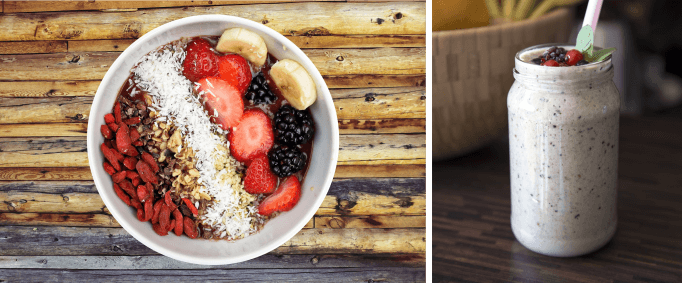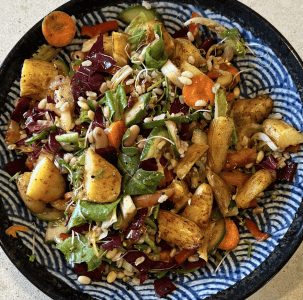Should You Have Carbs Before or After Workout?
Optimising Your Workout: A Guide to Timing Your Carbs Intake
The question of whether to have carbs before or after workout is a common one among fitness enthusiasts. The answer largely depends on your fitness goals and the type of workout you plan to engage in.
Which is more important: carbs before or after workout?
Maximise workout performance
Consuming carbs before exercising can be beneficial if your primary goal is to maximise performance during your workout. Carbohydrates are the body's preferred source of energy, and having a pre-workout meal or snack rich in carbs can provide the necessary fuel to power through your training session. Opt for easily digestible carbs like fruits, whole grains, or a small serving of low-fat yogurt.
Promote muscle recovery
On the other hand, if your main objective is to promote muscle recovery and growth, consuming carbs after your workout is crucial. During exercise, your body depletes its glycogen stores, which are essentially stored carbohydrates. Consuming carbs post-workout helps replenish these glycogen stores, aiding in muscle recovery and preventing muscle breakdown. Additionally, carbs stimulate the release of insulin, a hormone that promotes muscle protein synthesis.
It's important to note that the timing and quantity of carbs you consume before or after a workout can vary depending on your individual needs and preferences. Some people may find that a small snack before exercising provides enough energy, while others may prefer a more substantial meal.
Similarly, the amount of carbs you consume post-workout can depend on factors such as the intensity and duration of your workout.
Ultimately, finding the right balance of carbs before and after your workout is a matter of trial and error. Experiment with different approaches and listen to your body's response.
Carbs before workout
Many fitness experts and nutritionists recommend consuming carbohydrates before a workout. Carbohydrates are the body's primary source of energy, and they provide the fuel needed to power through intense physical activity. By consuming carbs before a workout, you can ensure that your body has enough glycogen stored in the muscles to sustain your energy levels during exercise.

However, the type and timing of carbohydrates you consume can make a difference in your performance. I recommend and prefer to opt for complex carbohydrates, such as whole grains, fruits, and vegetables, as they provide a steady release of energy and are rich in essential nutrients. Simple carbohydrates, like sugary snacks or drinks, may give you a quick burst of energy but can lead to a crash later on.
The timing of your carbohydrate intake is also crucial. It is best to consume carbs around 1-3 hours before your workout to allow enough time for digestion and absorption. This will ensure that the energy from the carbohydrates is readily available when you start exercising. However, if you have a sensitive stomach or prefer to exercise on an empty stomach, you may choose to have a small snack or a liquid carbohydrate source closer to your workout time.
For me, it depends on what time of the day I'm working out. I prefer to work out mid-morning on an empty stomach. I make sure to have plenty of complex carbohydrate foods the night before. If I'm working out in the afternoon, I'll have a light breakfast with a moderate amount of carbs.
Ultimately, the decision of whether to have carbs before a workout depends on your individual goals, preferences, and how your body responds. Some people may perform better with a pre-workout carbohydrate boost, while others may feel more comfortable exercising on an empty stomach. Experimenting with different approaches and listening to your body's cues can help you determine what works best for you.
Carbs after workout
Consuming carbohydrates after a workout is essential for optimal recovery and muscle glycogen replenishment. During exercise, your body uses up its glycogen stores, which are stored carbohydrates in the muscles. Consuming carbohydrates after a workout helps replenish these glycogen stores, allowing your muscles to recover and prepare for future workouts.

Like pre-workout carbohydrates, I recommend choosing complex carbohydrates for post-workout consumption.
My post-workout carbs include whole grains such as rice, potatoes, quinoa, legumes, and fruits. These carbohydrates provide a steady release of energy and are rich in nutrients that support muscle recovery.
The timing of post-workout carbohydrate consumption is crucial as well. It is best to consume carbohydrates within 30 minutes to 2 hours after your workout. During this time, your muscles are more receptive to absorbing and utilising carbohydrates for glycogen replenishment. Pairing carbohydrates with a source of protein can also be beneficial, as protein helps repair and rebuild muscle tissue.
However, it's important to note that the amount of carbohydrates you need after a workout may vary depending on factors such as the intensity and duration of your exercise, your individual goals, and your overall diet. Consulting with a nutritionist, dietitian, or nutrition coach can help you determine the appropriate amount of carbohydrates to consume pre-workout and post-workout based on your specific goals and needs.